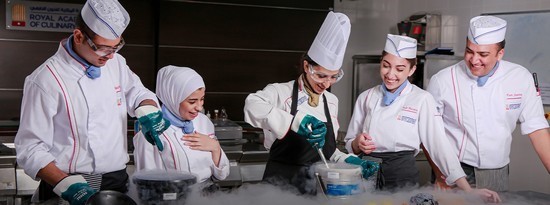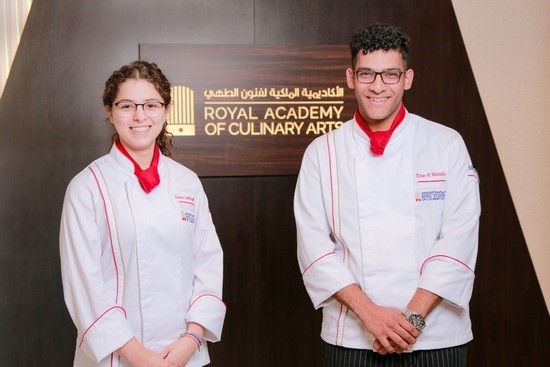The
Royal Academy of Culinary Arts’ (RACA) year-old bachelor program in food and
beverage management is highly praised by its students.
Formed in
collaboration with Ecole hôtelière de Lausanne — ranked the world’s top
hospitality university — RACA’s is the first BA in the Arab region to combine
hospitality management and culinary arts.
اضافة اعلان
Zaina Sabbagh
and Kinan Mubaidin graduated high school last year from Jordanian International
Schools and Jordan Hotel School, with Tawjihi scores of 99.4 and 74.4 percent
respectively. They are part of the first batch of students who will graduate
from
RACA’s new BA program.
While Mubaidin
had experience working as a barista, took multiple cooking courses, and managed
a bakery shop, Sabbagh described herself as a “blank page” before coming to
RACA.
“On my own, I
never actually cooked. So I was really scared that I wouldn’t grow accustomed
to the situation,” she admitted in an interview with
Jordan News.
“I’m not scared,
anymore, of not knowing.”

Rather than
prior experience, what is needed to succeed in this program is passion and
interest. Fundamental cooking methods, bakery, pastry, stewarding, cleaning,
and everything in between is covered. Conceptual learning around business
etiquette, food safety, nutrition, and even math is taught in tandem with the
physical work — all to achieve a well-rounded education.
The courses,
Sabbagh said, heavily revolve around gaining practical experience, and “being
in the kitchen”.
“But there’s
also a big part of it that’s theoretical,” she added.
RACA’s teaching
model is ideal for learning course content, said Mubaidin: “When you apply it,
you will memorize it by default. But when you memorize it without applying it,
you are not going to gain any knowledge at all.”
The four-year BA
is split in half, with two years dedicated to training in the culinary arts and
the remaining two in hospitality management. Each half includes a
five-month-long internship in which students work at five-star hotels to gain
hands-on experience.

This allows for
exploration and the development of new career aspirations that have the
potential to branch out in unexpected directions. Sabbagh, who has a newfound
love for pastry since joining the BA program, plans on taking advantage of
opportunities outside of classes by volunteering at the academy’s kitchens.
Mubaidin, on the
other hand, explained how his goals shifted after discovering his passion for
managing: “I joined to be a chef, but I changed my mind,” he said. “I see
myself in the front offices. I love talking with people, I love making
connections.”
He also
elaborated on the ways being at RACA has improved his social skills: “I’m more
open to receive criticism, to get complaints. I don’t mind. I love people and
that’s what I realized by joining RACA.”
Previously, RACA
only offered a diploma program. The establishment of the BA program gave
students the push they needed to pursue education in the hospitality and
culinary fields.

Sabbagh recalls
first telling her parents about her desire to study at RACA.
“I have four
siblings, and they’re all studying medicine,” she said. This put pressure on
her to get a bachelor’s degree as well. The BA program is “the best thing that
could have happened”.
“I signed up on
the spot,” she said, calling herself lucky to be part of the people who first
had access to this unique program.
According to
Mubaidin, knowing the specific names of tools, the science behind food
processes, and a deep knowledge of the kitchen gives students confidence and
prepares them to be capable members of any team.
“RACA is
developing the best hoteliers in the
Middle East,” he adds. After sharing on
his LinkedIn platform that he was available for work, he received over “11 job
offers in 30 minutes”.
Graduates’
greatest resource? Their committed instructors, who were described as
accessible, ready to answer questions, and eager to teach more than the confines
of the course material. These attributes create a motivating environment that
supports students and encourages effective learning.

In the coming
four years, an estimated 16,000 employees will be needed in the Jordanian
hospitality sector. The food and beverage management program at RACA intends to
fill this gap with competent industry professionals.
Enthusiastic and eager
to learn, Sabbagh and Mubaidin reflect the exciting future of the confident
graduates RACA’s BA program will produce.
Read more Good Food
Jordan News









